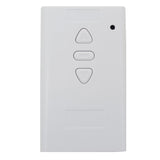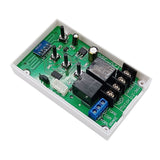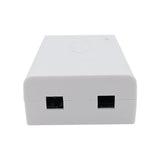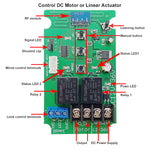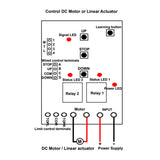Note: This product does not include a remote control/transmitter, if you need it, please click the link of the remote control/transmitter in the description below to buy.
Package Include:
1 x Receiver: S1FC-DC12
1 x User manual
Application:
Wireless DC Motor Remote Control Switch can be used in rolling blinds, rolling doors, projection screens, awnings, conveyors or other appliances and equipments with DC motors, it can remote control DC motor positive rotation or reverse rotation.
Features:
Wireless control, easy to install.
Suitable for DC motor.
DC 12~36V operating voltage range.
You can operate the motor to rotate in positive or reversal direction by using the buttons in the receiver or by the transmitter.
With three manual buttons: You can control the motor by manual buttons.
With limit control terminals: You can connect sensors, limit switches or external devices to stop the motor.
With wired control terminals: You can connect manual switches to control the motor.
The transmitter / remote can control the receiver from any place within a reliable working distance.
The wireless RF signal from the transmitter can pass through walls, floors, doors, or windows, but it will lose some operating range.
The receiver has reverse power protection and over current protection built in.
The receiver only works with the selected transmitter which is matched to the receiver.
One or more transmitters / remotes can control one or several receivers simultaneously.
Two or more receivers may be used in the same area.
Receiver Parameters:
Model: S1FC-DC
Operating Voltage: 12~36 VDC
Output Voltage: 12~36 VDC same as input voltage
Working Frequency: 433.92 MHz
Channel: 1 CH, can work with 1 DC motor
Quiescent Current: ≤6mA
Rated Current: 10A, so motor's maximum starting current cannot exceed 10A.
Wire range for the terminals: 22-14 AWG
2 Selectable Modes: Interlocking, Momentary
Operating Temperature: -20°C ~ +70°C
Case Size: 100 x 60 x 30 mm (4.0 x 2.4 x 1.2 inches)
Matching Transmitters:
This receiver can work with different transmitters.
1) When you set the receiver in Momentary mode, it should work with two button transmitter, such as model C-2-2 (100 Meter / 300 feet) or CV-2-2 (500 Meter / 1500 feet).
2) When you set the receiver in Interlocking mode, it should work with three buttons transmitter, such as model C-3-2 (100 Meter / 300 feet), CP-3 (500 Meter / 1500 feet), or CB-3-2 (1000 Meter / 3000 feet).
Working Range:
With a transmitter (such as CP-3) to form a complete set, the maximum working distance can reach 500 meters in an open ground.
The maximum working distance is a theoretical data, it shall be operated in an open ground, no barriers, no any interference. But in the practice, it will be hindered by trees, walls or other constructions, and will be interfered by other wireless signals. Therefore, the actual distance may not reach this maximum working distance.
If you want to have a further working range, you can install an external antenna to the receiver, and you also can use a powerful transmitter, such as CB series transmitters.
Setting different control modes:
1) Setting Interlocking mode: Short pins number 3 and 4 with a shouted cap.
The operation by the transmitter, such as CP-3:
Press the button ▲ on the transmitter: Motor rotates in positive direction.
Press the button ▼ on the transmitter: Motor rotates in reversal direction.
Press the button ■ on the transmitter: Motor stops.
The operation by the receiver:
Press the button ▲ on the receiver: Motor rotates in positive direction.
Press the button ▼ on the receiver: Motor rotates in reversal direction.
Press the button ■ on the receiver: Motor stops.
2) Setting Momentary mode: Short pins number 1 and 2 with a shouted cap.
The operation by the transmitter, such as CP-3:
Press and hold the button ▲ on the transmitter: Motor rotates in positive direction.
Release the button ▲: Motor stops.
Press and hold the button ▼ on the transmitter: Motor rotates in reversal direction.
Release the button ▼: Motor stops.
The operation by the receiver:
Press and hold the button ▲ on the receiver: Motor rotates in positive direction.
Release the button ▲: Motor stops.
Press and hold the button ▼ on the receiver: Motor rotates in reversal direction.
Release the button ▼: Motor stops.
Limit control terminals:
The receiver has limit control terminals, and you can connect external devices (with normally closed contact), such as sensors, limit switches to limit terminals, then use them to stop the motor.
When motor rotates in positive direction, if disconnect two terminals <TOPR> and <COM>, the motor will stop automatically.
When motor rotates in reversal direction, if disconnect two terminals <TOPL> and <COM>, the motor will stop automatically.
Wired control terminals:
The receiver has wired control terminals, and you can connect external devices (with normally open contact), such as manual switches to wired control terminals, then use them to stop the motor.
1) In Interlocking mode:
When connect two terminals <UP> and <COM>, the motor rotates in positive direction. And when connect two terminals <STOP> and <COM>, motor stops.
When connect two terminals <DOWN> and <COM>, the motor rotates reversal direction, or the linear actuator inward retracts. And when connect two terminals <STOP> and <COM>, motor stops.
2) In Momentary mode:
When connect two terminals <UP> and <COM>, the motor rotates in positive direction. And when disconnect two terminals <UP> and <COM>, motor stops.
When connect two terminals <DOWN> and <COM>, the motor rotates reversal direction. And when disconnect two terminals <DOWN> and <COM>, motor stops.





